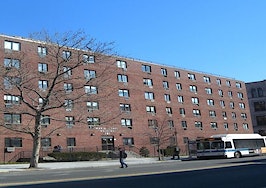New York City Mayor Bill de Blasio came out Wednesday night for his second presidential debate with his gloves off.
“When I’m president, we will even up the score and we will tax the hell out of the wealthy to make this a fairer country and to make sure it’s a country that puts working people first,” de Blasio declared during his opening remarks.
De Blasio repeated the comment at the end of the debate, while also plugging his new fundraising website TaxTheHell.com, and dropped the line again at the conclusion of the night during an interview with MSNBC.
The line is a catchy one with a certain Trumpian ring — you can imagine people chanting “tax the hell” at a rally — but now, critics are arguing that the actual policies behind de Blasio’s comments would in fact lead to financial problems, particularly in the real estate industry.
“If tax proposals like this in whole or in part were enacted, the stock market would come down by 40 percent right away,” Robert Willens, a financial analyst and former Lehman Brothers director, told Inman Friday. “It would destroy a lot of wealth in the country. It would dampen people’s incentives to work.”

Robert Willens
Willens also specifically singled out de Blasio’s real estate-related proposals as troubling. On his campaign website, for example, de Blasio states that he wants to tax “capital gains income at the same rate as “ordinary” income — so our tax code no longer favors wealthy investors over the workers who actually create the wealth in the first place.”
However, Willens said that some real estate investors routinely take advantage of capital gains tax rates when dealing with their investment properties, making de Blasio’s proposal a potential source of pain.
Additionally, de Blasio’s plan could reduce investors ability to do 1031 exchanges, which Willens explained as giving people the “ability to exchange on a tax free basis one parcel of real estate for another.”
“That’s a common way for real estate investors to rework their profiles,” Willens continued. “They rely on the fact that they can do that on a tax free basis. He would repeal that.”
Moreoever, Willens argued that de Blasio’s proposal could negatively impact people who have their wealth locked up in property, which is valuable but not very liquid.
“Now you’re going to be hit with a wealth tax that is going to cause you to sell, to liquidate your funds, to pay the tax,” he said. “We’ve never had a tax on merely owning property.”
De Blasio also wants to “repeal the estate tax… and replace it with a more aggressive inheritance tax,” according to his website.
But Willens said that de Blasio’s approach appears to involve taxing both the estate of a deceased person as well as the recipient who inherits any property from that estate. Willens called the proposal an “incredible” attempt to tax the same source of funds twice.
Finally, De Blasio says on his site that he wants to “close the real estate tax loophole,” as well as “the unwarranted giveaways to rich real estate investors like President Trump.” The site provides few details about how exactly de Blasio might undertake such a project, but Willens nevertheless described the New York mayor’s overall approach over all to real estate as “pretty draconian.”
“The real estate industry, you can see it has a special place in his heart,” Willens added. “Wall Street and real estate. These are the people that he’s focusing the most attention on.”

HUD Secretary Ben Carson, left, and de Blasio shake hands in New York City in January. | Credit: Drew Angerer and Getty Images.
Other financial analysts were similarly critical of de Blasio’s proposal, which he says on his site is the “most aggressive tax on extreme wealth of any candidate in the race.” Speaking to CBS New York, Inverness Counsel chief investment strategist Timothy Ghriskey called it “extreme.”
And Barry Ritholtz, chief investment officer at Ritholtz Wealth Management in New York, told Vox that the proposal could be “self-defeating” because “the wealthy will find ways to move everything but real estate off-shore.”
De Blasio’s campaign did not immediately respond to Inman’s request for comment Friday. Inman also reached out to a number of different financial analysts Friday in an effort to find varying opinions about the tax proposal, and will update this post if those analysts respond.
In any case, it’s highly unlikely at this point that de Blasio will get anywhere near the White House. Polling and news site FiveThirtyEight currently has the mayor in a multi-way tie for last place among nearly two dozen candidates. And a New York Times piece Friday about the contenders who have qualified for the next debate didn’t even mention de Blasio by name.

De Blasio, far right, at the Democratic presidential debate in Detroit on Wednesday. | Credit: Scott Olson and Getty Images.
Still, even if de Blasio’s tax plan doesn’t ultimately become law, it is at least symbolically important. For one thing, de Blasio is still mayor of the largest city in the U.S., and his presidential proposals presumably offer insights into whatever strategies he might intend for New York City. In other words, de Blasio may never “tax the hell out of the wealthy” across the country, but he could meaningfully push toward that goal in New York.
On a deeper level, de Blasio’s aggressive tax policy also typifies the way that the current Democratic party — or at least certain wings of it — are leaning increasingly to the left on fiscal policy issues. The other most obvious evidence of this shift is that left-leaning Bernie Sanders and Elizabeth Warren are both top tier candidates (FiveThirtyEight‘s poll aggregator put them in second and third place, respectively, on Friday).
The Democrats’ brightest rising stars, such as Alexandria Ocasio-Cortez, also lean further left than long-standing establishment stalwarts such as Nancy Pelosi. And just today Slate ran a piece essentially arguing that left-leaning progressives have become mainstream in a party once more favorable to moderates.
De Blasio’s proposal has emerged out of that left-friendly context, and so it’s easy to imagine some of his ideas living on in one form or another even if, or when, his presidential campaign dies.
Asked about the lingering affects of de Blasio’s tax proposals, Willens said the mayor doesn’t seem to have a major impact on other candidates. But Willens does still ultimately see the concepts in the proposal as capturing something of the Democratic party’s embrace of the left.
“It seems like even the mainstream candidates are trying very hard to move left as much as possible,” Willens said, “and there’s no reason to think that they might not themselves embrace some of these proposals.”













